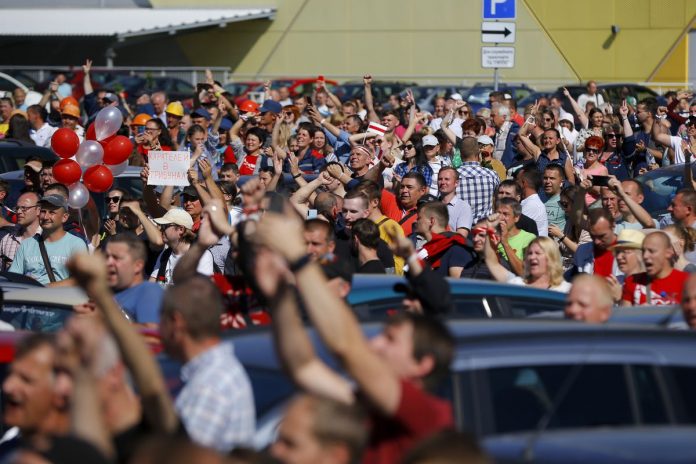A mass movement of strikes and protests has developed in Belarus, protesting the corrupt authoritarian rule of Aleksander Lukashenko. Hundreds of thousands have taken to the streets. There are strikes in manufacturing plants, the energy sector, steel works, mining, petrochemicals, the media and other sectors. Lukashenko and his allies have responded with repression, unleashing state forces to attack protests and arresting strike leaders, which has further radicalised and broadened the movement.
We stand in solidarity with the struggle in Belarus. It is part of a new wave of protests—also encompassing Lebanon, Bolivia, Mali and Thailand—demanding political and social change. This follows a wave of revolts in 2019 that was interrupted by the Coronavirus pandemic, but which is now re-emerging, in many cases deepened by the impact of the pandemic and the associated economic collapse.
The movement in Belarus has been compared to the so-called “Colour Revolutions” in Ukraine, Georgia and Kyrgyzstan, or the 2013-14 “Euromaidan” protests in Ukraine. However, this ignores the specific context of the Belarusian rebellion. Unlike in Russia and many former Soviet republics, when Stalinism fell Belarus did not experience full-scale privatisation and deregulation of its economy. The collapse in living standards, experienced by countries undergoing a violent transition from state capitalism to free market capitalism, was more muted. Moreover, Belarus did not witness the creation of a class of oligarchs, as occurred in Ukraine or in Russia. Instead, Lukashenko and his close allies were able to maintain a high degree of centralised power in the transition.
Initially, in exchange for political support for Russia, Belarus benefited from cheap Russian oil, which it refined and re-exported. Russia also provided the major market for its agricultural products and manufactured output. In recent years, the decline of this economic support as relations with Russia soured, and the collapse of oil prices, have placed increased pressure on Lukashenko’s regime. The economy has stagnated and Lukashenko has turned towards privatisation and attacks on workers’ living standards. This includes his 2017 attempt to introduce a tax on unemployed workers and wage freezes over several years, amid rising prices of consumer goods. In recent years Lukashenko has claimed that Belarusian enterprises are available for privatisation, provided the price is right. The regime has also sought to balance Russian influence by building ties with China, the EU and Britain. As late as March this year, the Belarussian military engaged in joint exercises with the British Royal Marines.
The worsening economic situation for the mass of Belarussians, together with the mishandling of the Covid-19 crisis, provide the context for the rigged elections, held on 9 August, in which Lukashenko claimed to win 80 percent of the vote and allotted 10 percent to his rival, the opposition candidate, Sviatlana Tsikhanouskaya. This helps to explain why the movement takes the form not simply of huge street protests, but also of widespread strikes, largely in state-run enterprises where workers previously had access to only pro-regime trade unions.
Tsikhanouskaya and her allies have lagged behind the struggle, initially calling on protesters to abide by the law and avoid violent confrontations. The official liberal-nationalist opposition offers little by way of a solution to the hardship faced by ordinary Belarussians. Aside from the call for new elections, its alternative to Lukashenko’s rule is the further liberalisation of the economy. Imperialist powers are also seeking to shape the emerging movement in their interests. This includes Western powers such as the US, the EU and Britain, which are now courting sections of the official liberal-nationalist opposition. It also includes Vladimir Putin’s Russian, which wants to use the movement to rebuild its influence in the region.
The real alternative to this is the growth and development of the independent movement of workers, posing both social and political demands from below. We are seeing in Belarus today the immense power unleashed when workers organise collectively. Thus far, the strike movement has largely limited itself to calls for new elections, an end to repression and the release of political prisoners. However, a minority within the workers’ movement have expressed a demand that privatisations be ruled out, and that issues of unemployment and poverty by addressed. Deepening the social demands of the movement can help to wrest control from those committed to strengthening the hand of capitalist forces—both would-be Belarussian oligarchs and multinational corporations who see the country as ripe for privatisation.
The legacy of Stalinism has for decades buried the revolutionary socialist tradition across the former Soviet republics. This is especially true in Belarus, where many of the vestiges of Stalinism were preserved. It is our hope that this movement will see the re-emergence of a genuine socialist tradition, based on the real movement of workers for their own emancipation. This cannot be limited to the introduction of parliamentary democracy, but must fight for democratic control from below of all aspects of society. The current movement creates a context in which that becomes a genuine possibility.
The International Socialist Tendency offers its full support for, and solidarity with, the political and economic struggles of the Belarussian masses. We oppose the crackdown on protests and strikes by Lukashenko’s forces and call for the release of all political prisoners. We oppose and will campaign against any intervention in the politics of Belarus by our own governments, something that can only stifle the possibility of a genuine socialist alternative emerging.
The International Socialist Tendency (IST)
25 August 2020
First published by the IST here









